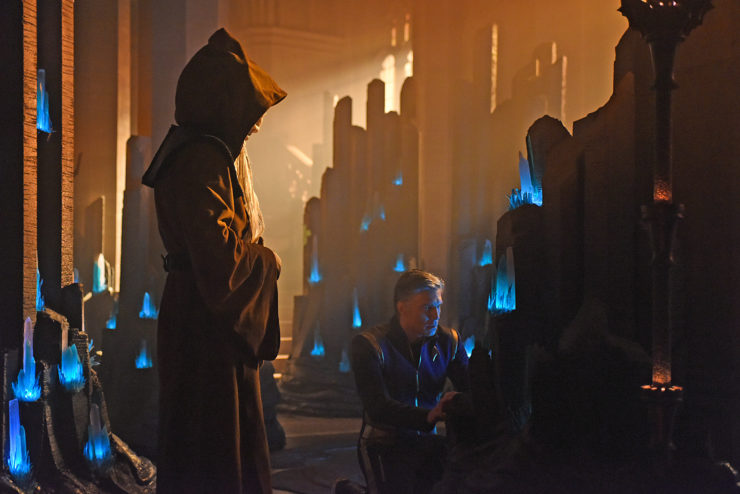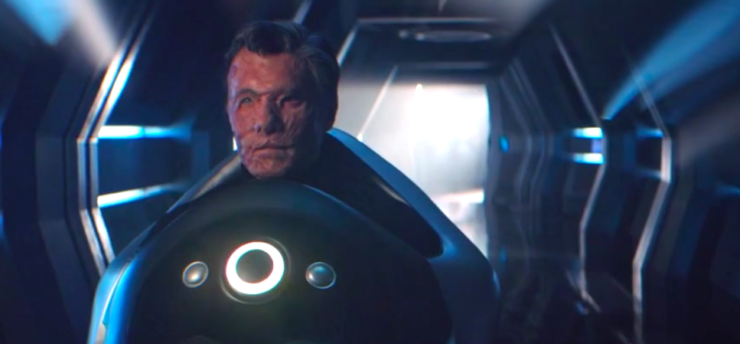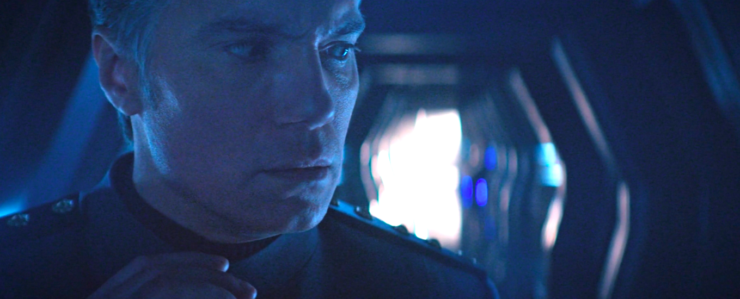Last year, Captain Pike didn’t have a personality. Before Star Trek: Discovery’s second season, Christopher Pike was less of a character and more of an answer to a trivia question. But now, thanks in part to the new episode “Through the Valley of the Shadows,” Pike has become a completely rounded person. Not only does Pike’s decision in this episode make him one the bravest Star Trek captains ever, we now know he actually faced —and passed — one test that James T. Kirk famously screwed up.
Spoilers ahead for Star Trek: Discovery, season 2, episode 12, “Through the Valley of the Shadows,”
Anson Mount’s grounding performance amidst the insane plot twists of season 2 of Discovery has resulted in a far more relatable and personable Captain Pike than any other previous depiction of him in onscreen Trek. In “The Cage,” Jeffrey Hunter’s Pike comes across as a moody misanthrope, a guy you root for because the situation he’s in is so nuts. On the other end of the spectrum is Bruce Greenwood’s Captain Pike from the first two J.J. Abrams reboot Trek movies; a version of the character who was super-likable, but also totally flat. Greenwood’s Pike is basically your cool uncle who gave you a great job and also sometimes drove you home from bars. Sean Keeney’s tragically disabled Pike in “The Menagerie,” is worth mentioning, of course, but it’s not like the actor was given a ton to play with, and we never got a sense for who Pike was in that performance.
But, Anson Mount’s Pike in the latest episode of Discovery changes everything. Turns out that Pike now knows about his eventual tragic future in “The Menagerie” and we as Trek fans know that he chooses to go through with it anyway. Keep in mind, that this is the same character who — in “The Cage,” actually tells the ship’s doctor he’s thinking about giving up being a starship captain and has kind of, sort of, toyed around with the idea of being a space pimp in the Orion sector. You cannot imagine Discovery‘s Pike hoarding this kind of self-centered desire. Which, brings us to the question, what has changed in Pike since the events of “The Cage”?
Possibly two things. First: it’s clear that the impact of the Klingon war weighs heavy on Pike. He feels vocally guilty about the Enterprise not being involved in the war. Before the season started, Mount reinforced this idea and told me that Pike’s foolhardiness in this season is “an insecurity issue, that is stemming from the fact that he and his crew and the Enterprise were held out of the Klingon War.” So, a lot of Pike’s approach to his missions and his captaincy post-“Cage” is connected to his guilt about that.
The second factor is Vina and the events of “The Cage” specifically. In the earlier Discovery episode “If Memory Serves,” it’s made pretty clear that Pike still feels hugely conflicted about leaving Vina behind on Talos IV. Though Pike was cynical about how life was fleeting and temporary at the start of the “The Cage,” his feelings for Vina and his experience with the Talosians made him look outward again, renewing his focus on how his actions affect those around him. Pike sees the Klingon war and Vina’s presence on Talos IV as personal failures; not only that, but Pike sees both of these personal failures specifically as derelictions of duty. To his mind, he abandoned Vina. He abandoned the Federation.
These experiences clearly set Pike straight and made him double-down on being the best of Starfleet that he could be, and everything we see in Discovery seems to prove this. Which brings us to “Through the Valley of the Shadows,” Captain Pike’s encounter with the time crystal, and the sudden reveal of a future where he faces his own personal Kobayashi Maru.
In Star Trek II: The Wrath of Khan, we learned that all Starfleet cadets have to take a test called “The No-Win Scenario.” In all versions of this test, they are sent to rescue a ship called the Kobayashi Maru, but they literally can’t. The whole thing is a trap, and everyone is going to die. You can’t beat the test. It’s just there to remind these Starfleet cadets that failure is going to happen and that it’s possible that your duty to Starfleet and the Federation’s ideals is going to mean accepting death.

When Pike glimpses his terrible future in “Through the Valley of the Shadow,” the Klingon Time Keeper, Tenavik, gives him the opportunity to walk away from this destiny, a way to cheat a no-win scenario. Instead, Pike closes his eyes and intones:
You’re a Starfleet captain. You believe in service, sacrifice, compassion… in love.
And so, Pike presents us with the only true solution we’ve seen to the Kobayashi Maru. He accepts the fact that in order to win, he’s going to have to lose.
In The Wrath of Khan, we learn that James T. Kirk “doesn’t believe in the no-win scenario.” Granted, Kirk cops to this at the end of the movie, after Spock’s death, he tells his son David that he never really had to face it before, but rather “tricked it” or “cheated.” Still, because Spock comes back to life in the next movie, it feels like Kirk didn’t really learn the lesson at all. Now, I’m not saying Kirk isn’t awesome, because he totally is. It’s just that when it comes to facing an impossible decision, Kirk’s always going to find a way to weasel out of it.
But, with Pike, it’s the opposite. He knows he has to decide right there, alone with a Klingon he only just met, who he’s going to be. On top of that, he can’t tell anyone what he knows, because it will totally endanger the timeline, which means it’s a private decision. Pike accepts his own horrific fate, alone, in the dark, and keeps it to himself. He then goes back to the USS Discovery and sits down and acts like a boss again.

We’ve seen Picard, Sisko, and Janeway encounter the hard stops of duty before. But, because Pike’s future is so sad, and he knows it, his bravery really makes Kirk kind of seem flippant in retrospect. True, the films The Wrath of Khan and Into Darkness both do a fairly good job of chipping away at Kirk’s ego and self-centered belief that nothing will go wrong for him. But, there’s something more deeply resonant about Pike’s sacrifice in Discovery. Longtime fans of Star Trek know how this ends. This, new, fully realized version of Captain Pike doesn’t have unlimited adventures like so many other Star Trek characters. Which, in some ways is what makes Pike’s sacrifice in Discovery so profound. For once in the Star Trek franchise, you really believe at least one thing is written in stone.
If there was ever an argument for why a complicated prequel can be great, Star Trek: Discovery just made it. If the ending of Pike’s story hadn’t already been told in “The Menagerie,” then his idealism may not have found expression in Discovery. We may have already known what happened to Pike in the Trek canon, but thanks to this season of Discovery, and this episode, in particular, we finally get why he mattered.
Ryan Britt is the author of Luke Skywalker Can’t Read and an editor at Fatherly. He is a longtime contributor to Tor.com.










